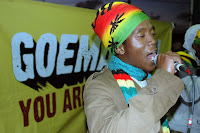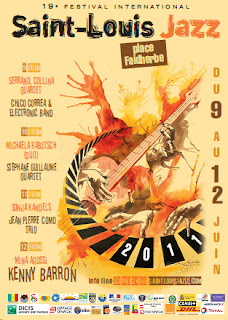What is goema?
Goema is a music of liberation. It is a music of transcendence. Cape Town is a pirate city. We are a pirate of cultures. It's like Cape Town has pirated pieces of the whole world. Everything is gathered here. Cape Town is a port city after all, absorbing the world over hundreds of years. It's a touch of Europe, a little bit of India and Malaysia, it is a piece of Africa, there's Brazil in here and there's America and Israel and Maputo. Cape Town is not one thing: it is many things in one. The music of this city with multiple identities is called goema. The name originates with the Khoe people. The Khoe women played a drum, it was called a goma, because of the ox skin that covered the drum. The women would play and the men would dance. Over hundreds of years, bantu tribes migrated south, missionaries arrived, colonisers laid claim and slaves were imported to the city. As the music of these worlds collided and became a common language, the goma became goema. Th

